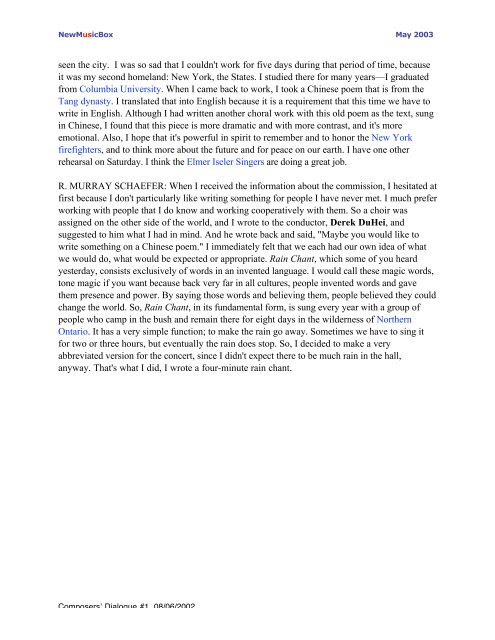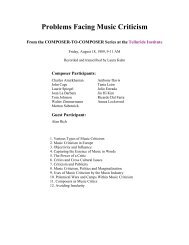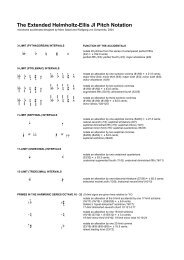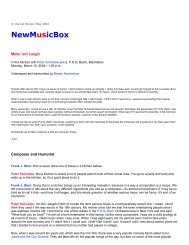Sixth World Symposium on Choral Music ... - NewMusicBox
Sixth World Symposium on Choral Music ... - NewMusicBox
Sixth World Symposium on Choral Music ... - NewMusicBox
Create successful ePaper yourself
Turn your PDF publications into a flip-book with our unique Google optimized e-Paper software.
New<strong>Music</strong>Box May 2003<br />
seen the city. I was so sad that I couldn't work for five days during that period of time, because<br />
it was my sec<strong>on</strong>d homeland: New York, the States. I studied there for many years—I graduated<br />
from Columbia University. When I came back to work, I took a Chinese poem that is from the<br />
Tang dynasty. I translated that into English because it is a requirement that this time we have to<br />
write in English. Although I had written another choral work with this old poem as the text, sung<br />
in Chinese, I found that this piece is more dramatic and with more c<strong>on</strong>trast, and it's more<br />
emoti<strong>on</strong>al. Also, I hope that it's powerful in spirit to remember and to h<strong>on</strong>or the New York<br />
firefighters, and to think more about the future and for peace <strong>on</strong> our earth. I have <strong>on</strong>e other<br />
rehearsal <strong>on</strong> Saturday. I think the Elmer Iseler Singers are doing a great job.<br />
R. MURRAY SCHAEFER: When I received the informati<strong>on</strong> about the commissi<strong>on</strong>, I hesitated at<br />
first because I d<strong>on</strong>'t particularly like writing something for people I have never met. I much prefer<br />
working with people that I do know and working cooperatively with them. So a choir was<br />
assigned <strong>on</strong> the other side of the world, and I wrote to the c<strong>on</strong>ductor, Derek DuHei, and<br />
suggested to him what I had in mind. And he wrote back and said, "Maybe you would like to<br />
write something <strong>on</strong> a Chinese poem." I immediately felt that we each had our own idea of what<br />
we would do, what would be expected or appropriate. Rain Chant, which some of you heard<br />
yesterday, c<strong>on</strong>sists exclusively of words in an invented language. I would call these magic words,<br />
t<strong>on</strong>e magic if you want because back very far in all cultures, people invented words and gave<br />
them presence and power. By saying those words and believing them, people believed they could<br />
change the world. So, Rain Chant, in its fundamental form, is sung every year with a group of<br />
people who camp in the bush and remain there for eight days in the wilderness of Northern<br />
Ontario. It has a very simple functi<strong>on</strong>; to make the rain go away. Sometimes we have to sing it<br />
for two or three hours, but eventually the rain does stop. So, I decided to make a very<br />
abbreviated versi<strong>on</strong> for the c<strong>on</strong>cert, since I didn't expect there to be much rain in the hall,<br />
anyway. That's what I did, I wrote a four-minute rain chant.<br />
Composers’ Dialogue #1, 08/06/2002





